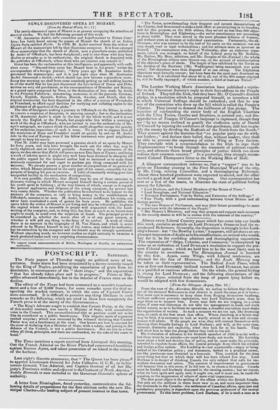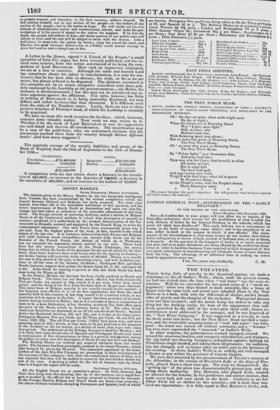[From the Glasgow Argus, Dec. 10.] From the tone of
the Aberdeen Herald, we incline to believe that the tem- per of the electoral Reformers in that district is much the same as it is here— that more care is necessary to keep them front flinging themselves headlong, without sufficient previous explanation, into Lord Durham's arms, than to urge them on to support him. Every man feels we are verging on a crisis when, if some real statesman do not take the management in band, and work before nature, so as to facilitate its operations, a dreadful convulsion must shake the organization of society. At such a moment we are too apt, like drowning men, to catch at the first straw that offers. Where clutching at a brittle stay may be fatal, it is necessary to look as warily around us as time and circum- stances will admit. If the people are wise, they will content themselves with showing their friendly feelings to Lord Durham ; and will, at the same tints, intimate, distinctly and explicitly, what they look for at his hands. They will allow him to take the plunge before they rush to his aid. His declaration of adhesion to his Scottish speeches of 1834 is so far well— but there must be no mistake—we must have deeds, not words. His Lordship must adopt a bold and decisive line of policy, and he must make the principle, intended to regulate home affairs, the central principle from which his colonial and foreign policy radiate. His Lordship is—not unnaturally—angry at being balked in his Canadian policy ; and statesmen, balked in a practical career, are like passionate men thwarted in a love-suit. They overlook for the time every thing but that on which their will has been refused free way. Lord Durham is in danger of thinking Canada the only subject that calls for im- mediate discussion and action. The enemies of improvement in government will humour him in this error, if he fall into it, to create a diversion. Canada must be frankly and fearlessly discussed in the ensuing session ; but we repeat, what we have again and again said, it ought not, and it must not, be made the question, to the suppression of others of more vital impor lance. The first peat object is the settling of the affairs within the British Islands. Not only are the millions in them more near to us, and more important than the thousands in the Canada,: the settlement of Canadian affairs, upon just and satisfactory principle', is dependent upon the previous settlement of the central government. To this latter problem, Lord 'Durham, if he in. such a man as is
at present wanted, will therefore, in the first instance, address himself. He will address himself, not to any section of the people—or the leaders of any section of the people—hut to the nation at large. He will strike out his own scheme of administrative policy and constitutional reform, and make his pro- mulgation of it his means of appeal to the nation for support. If he hits the mark, the people will adhere to him—the better portion of our public men will adhere to him—and the rest will be obliged to swim with the stream. Like a bold lover, he must take the nation by storm ; clasp her round the waist, and kiss her into good humour, before a fop or a fribble could muster courage to • press her hand, or cast a sheep's eye at her.



























 Previous page
Previous page